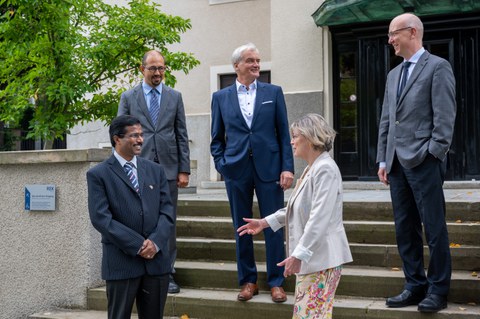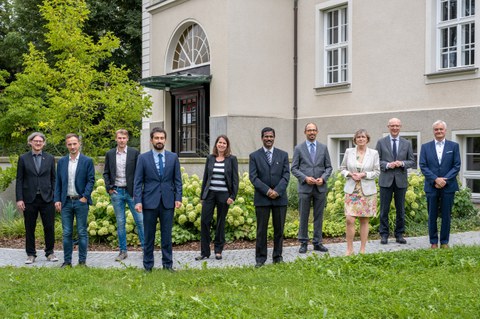Aug 23, 2021
Working together to tackle global challenges – TUD seeks to enhance partnership with India

Visitors to the University Executive Board, front row: Dr. Reddy and Prof. Angela Rösen-Wolff, Vice-Rector Research; back row from left to right: Prof. Ercan Altinsoy, Prof. Jürgen Stamm and Prof. Niels Modler.
With nearly 1.4 billion inhabitants, India is the second-most populous country in the world and the largest democracy. It has undergone rapid development over the past decades, meaning that it has a key role to play in the fight against climate change. The country has enjoyed long-term relations with TU Dresden and Germany as a whole, particularly in the area of science and technology. In 2020, TU Dresden hosted 385 students from India, making them the largest body of international students at our university. The university already collaborates on an interdisciplinary level with multiple institutions of higher education and research in Bangalore, Chennai, Mandi, New Delhi and elsewhere in India. And these cooperative efforts are set to be enhanced in the future. On August 20, 2021, TU Dresden welcomed Dr. Madhusudan Reddy Nandineni, Counsellor for Science & Technology at the Indian embassy in Germany, to discuss current and future joint endeavors.
Selection of current collaborative projects
Global Water and Climate Adaptation Center (ABCD Center)
The international community faces urgent climate and environmental concerns, whose significance has only become clearer in light of the ongoing pandemic. Against this backdrop, the German Academic Exchange Service (DAAD) is using funds from the German Federal Foreign Office to finance the establishment of Global Centers. The primary objective of this undertaking is the interdisciplinary linking of science, policy, economics and civil society to effectively apply research findings in practice.
TU Dresden’s School of Civil and Environmental Engineering and RWTH Aachen are working together with partners from the Asian Institute of Technology (Bangkok, Thailand), the Indian Institute of Technology Madras (Chennai, India) and the Institute for Integrated Management of Material Fluxes and of Resources at the United Nations University (UNU-FLORES) in Dresden to set up a Global Water and Climate Adaptation Center. Named so for the initials of the four locations involved, the ABCD Center will focus on measures to adapt to climate change in the Global South, in particular in the water sector. Researchers will work closely to combine their efforts and findings from three thematic clusters:
- Water security, water resource management, reliable supply of potable water and water treatment
- Ecosystem resilience and nature-based adaption measures
- Traditional knowledge, local economies and social acceptance
The new Global Center promotes the mobility of early-career researchers, provides scholarships for master’s and doctoral students, and is in the process of designing and creating a new joint international degree program on water security and global change.

Visitors to the University Executive Board, front row: Dr. Reddy and Prof. Angela Rösen-Wolff, Vice-Rector Research; back row from left to right: Prof. Ercan Altinsoy, Prof. Jürgen Stamm and Prof. Niels Modler.
From left to right: Dr. André Lindner (Director of the School of Civil and Environmental Engineering, ABCD Center), Steve Federow (Advisor to the CTIO), Danny Klotzsche (Group Leader of Team Strategy and Internationalization), Dr. Angelos Filippatos (Group Leader of the Dresden Center for Intelligent Materials, COMPOLL Project), Maike Heitkamp (International Affairs Advisor in the School of Engineering Sciences, COMPOLL Project), Dr. Madhusudan Reddy Nandineni, Prof. Ercan Altinsoy (Heritage Network), Prof. Angela Rösen-Wolff (Vice-Rector Research), Prof. Niels Modler (COMPOLL Project) and Prof. Jürgen Stamm (ABCD Center).
COMPOLL: Combating environmental pollution through internationalization of education in India and Germany
In light of the constantly increasing human population, a minimization of the impact of humanity’s actions on the environment becomes a vital issue. Reducing noise, air and water pollution as well as enacting adequate waste management have become some of the greatest global challenges that humans have ever faced. Approaching these tasks is particularly difficult considering the need for comprehensive international cooperation between societies in various stages of development which all speak different languages and come from different cultural backgrounds, and which all have different local problems and beliefs.
The DAAD project “COMPOLL: Combating environmental pollution through internationalization of education in Germany and India” seeks to find a better understanding of the challenges, shortcomings and solutions regarding pollution awareness in the two countries. TU Dresden’s Institute of Lightweight Engineering and Polymer Technology and the Institute of Technology Delhi are cooperating partners who have jointly submitted the project proposal. The project’s two main objectives are to raise awareness of topics such as reducing plastic waste, recycling and developing sustainable design strategies as well as to strengthen the partnership between TU Dresden and the Indian Institute of Technology Delhi.
Nanoscience and nanotechnology in Life Sciences
A collaborative network between Technische Universität Dresden (TUD) and the Centre for Nano Science and Engineering (CeNSE) of the Indian Institute for Science aims at implementing nanoengineering solutions into life sciences and gaining a better understanding of the complex physical molecular interactions of principles of life. In two focus areas, "Active Matter (Microswimmers, Smart Materials), Sensors, Microsystems and Photonics“ and " Self Organisation in Soft Materials”, researchers from universities, non-academic institutions as well as institutes with a focus on applied science such as Fraunhofer IKTS collaborate in both research and teaching.
This project is supported by the DAAD Program "A New Passage to India."
The Indo-European Heritage Network seeks to promote collaboration between higher education institutions in Europe and India in the area of engineering. As a Member of the Steering & Executive Committee (SEC), Prof. Ercan Altinsoy represents TU Dresden as the only German university currently actively engaged in the Heritage Network. The Network’s objective is to develop academic and scientific exchange between Europe and India in the fields of engineering, science, design and technology.
In India, China and Vietnam there is a common requirement to qualify teachers in both theory teaching and practice in vocational education as well as integrating education, teaching and information technology. The national documents mention the development of education and teachers as key priorities. In addition, the professional development programs for university teachers and the international teacher training programs at HEIs should be established, so as to continuously improve the capabilities of university teachers in education and teaching, academic research, innovative practices, and international exchanges. The FRACTION central objective is to deliver a unique opportunity to enhance the education of teachers and gain recognition for high-quality professional practice through developing a postgraduate program in the field of education with innovative teaching methodologies, enhancing pedagogical competencies. This will enable the teachers to respond to the increasing complex and diverse educational and social environment, by delivering effective & innovative teaching and learning experiences in the classroom to enhance the quality and employability of graduates.
Contact at the International Office of TU Dresden
Peter Rosenbaum
Tel. +49 351 46337571
